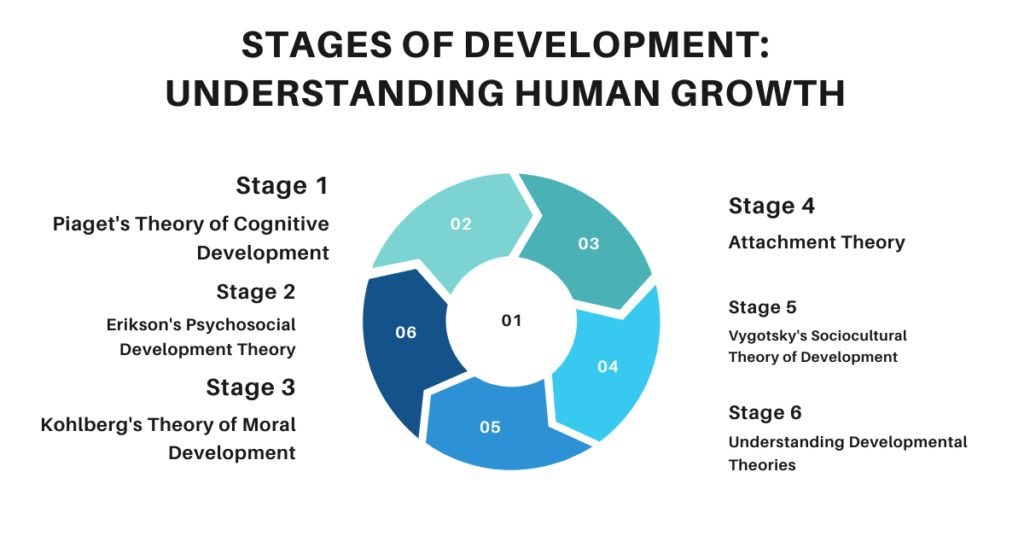1. Introduction to Stages of Development
Development is a complex process encompassing various aspects of growth and change in individuals over time. Understanding the stages of development is crucial as it provides insights into human behavior, cognition, and socio-emotional functioning.
2. Piaget’s Theory of Cognitive Development
Sensorimotor Stage
The sensorimotor stage, according to Piaget, occurs from birth to around two years old. During this stage, infants develop their sensory and motor skills, gradually understanding object permanence and engaging in simple problem-solving.
Preoperational Stage
In the preoperational stage (from around two to seven years old), children start to develop language and symbolic thinking. However, they struggle with understanding concepts like conservation and may exhibit egocentrism.
Concrete Operational Stage
Between the ages of seven and eleven, children enter the concrete operational stage. Here, they begin to grasp more complex ideas, such as conservation and reversibility, and develop logical thinking skills, although they may still struggle with abstract thinking.
Formal Operational Stage
The formal operational stage, typically from adolescence onward, involves the ability to think abstractly and hypothetically. Individuals in this stage can engage in complex problem-solving and consider multiple perspectives.
3. Erikson’s Psychosocial Development Theory
Erikson proposed a theory of psychosocial development consisting of several stages, each associated with a unique developmental challenge.
Trust vs. Mistrust
During infancy (0-1 year), the primary task is to develop trust in caregivers.
Autonomy vs. Shame and Doubt
Toddlers (1-3 years) strive for independence while navigating feelings of shame and doubt.
Initiative vs. Guilt
Preschoolers (3-6 years) explore their environment and develop a sense of initiative while learning to manage guilt.
Industry vs. Inferiority
In middle childhood (6-12 years), children focus on mastering skills and competencies, avoiding feelings of inferiority.
Identity vs. Role Confusion
Adolescents (12-18 years) seek to establish a sense of identity amidst social and personal exploration.
Intimacy vs. Isolation
Young adults (18-40 years) develop intimate relationships while avoiding isolation.
Generativity vs. Stagnation
Middle-aged adults (40-65 years) strive for productivity and contribution to society, avoiding stagnation.
Integrity vs. Despair
In late adulthood (65+ years), individuals reflect on life and strive for a sense of fulfillment and acceptance.
4. Kohlberg’s Theory of Moral Development
Kohlberg proposed three levels of moral development, each with two stages.
Preconventional Level
At this level, moral reasoning is based on obedience and self-interest.
Conventional Level
Moral reasoning is driven by conformity to social norms and maintaining social order.
Postconventional Level
Individuals at this level base moral judgments on universal ethical principles and individual rights.
5. Attachment Theory
Attachment theory, developed by John Bowlby, explores the bond between caregivers and infants.
Secure Attachment
Infants with secure attachment feel safe and confident in exploring their environment, knowing their caregiver will provide support.
Insecure Attachment
Insecure attachment may manifest as avoidant, ambivalent, or disorganized attachment styles, leading to difficulties in forming healthy relationships.
6. Vygotsky’s Sociocultural Theory of Development
Vygotsky emphasized the role of social interaction and cultural context in cognitive development.
Zone of Proximal Development
The zone of proximal development refers to the range of tasks a child can perform with assistance but cannot yet do independently.
Scaffolding
Scaffolding involves providing temporary support to help individuals learn new concepts or skills until they can do so independently.
Table: Understanding Developmental Theories
| Theory | Key Focus | Primary Proponent |
|---|---|---|
| Piaget’s Cognitive Development | Cognitive milestones and stages of learning | Jean Piaget |
| Erikson’s Psychosocial Development | Socio-emotional challenges across lifespan | Erik Erikson |
| Kohlberg’s Moral Development | Development of moral reasoning | Lawrence Kohlberg |
| Attachment Theory | Bond between caregivers and infants | John Bowlby |
| Vygotsky’s Sociocultural Theory | Influence of social interaction on cognition | Lev Vygotsky |
7. Conclusion
Understanding the stages of development, as proposed by various theorists, provides valuable insights into human growth and behavior across the lifespan. From cognitive milestones to socio-emotional challenges, each stage contributes to the holistic development of individuals.
8. FAQs
Q1. Why are the stages of development important?
Understanding the stages of development helps educators, parents, and caregivers support individuals’ growth and address their specific needs at each stage.
Q2. Are the stages of development universally applicable?
While certain developmental milestones are universal, cultural and individual differences can influence the pace and manifestation of development.
Q3. How can I apply knowledge of developmental stages in my profession?
Professionals in fields such as education, psychology, and healthcare can use developmental theories to inform their practice and tailor interventions to individuals’ developmental needs.
Q4. What happens if individuals do not progress through the stages of development smoothly?
Disruptions in developmental stages can lead to challenges in various areas of functioning, potentially requiring intervention and support.
Q5. Can adults experience developmental stages?
While developmental theorists primarily focused on childhood and adolescence, some theories, like Erikson’s psychosocial stages, also apply to adulthood, emphasizing ongoing growth and adaptation throughout life.


